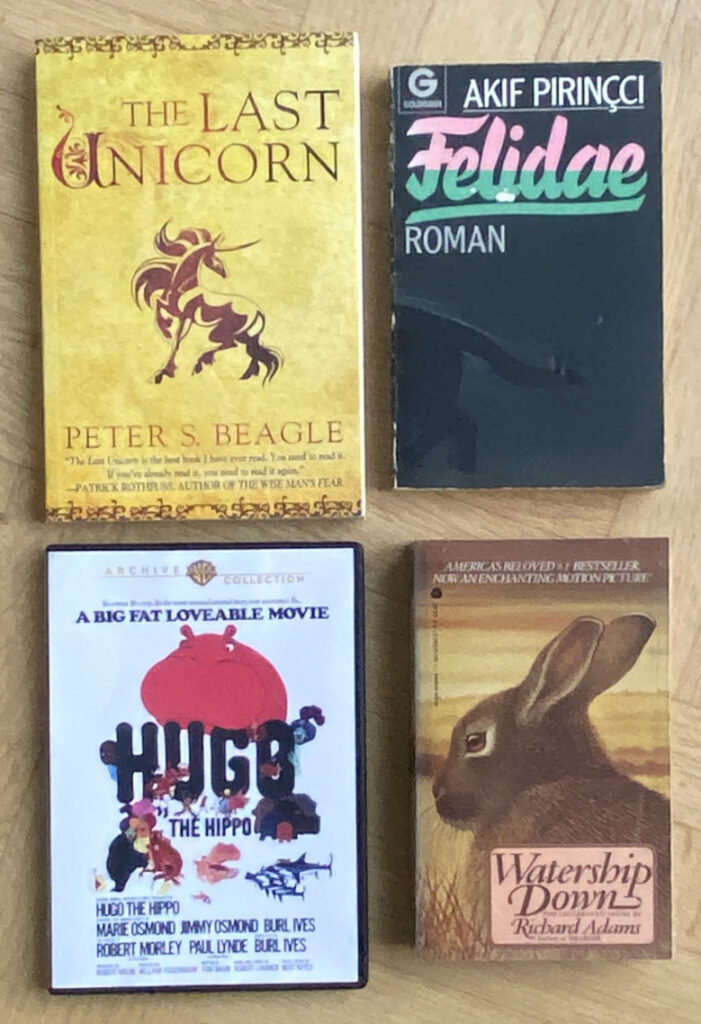This is a rather personal article and therefore may not be interesting for everybody. I write it, because I would like to know if others made the same experiences.
I have always had an exceptional good memory. Much to the annoyance of coworkers and friends, because I can become a stickler for details. With a lot of stress and duties, I was proven wrong from time to time during the last years. So, I became a little bit more careful before declaring my version of things “the truth”.
Still, I never mistrusted my memories from childhood. Overall, I do not remember too much from my earlier childhood and there were no big shocks real life gave me. But I got a few from animated films. In later years I wondered why in the 1980s and 1990s adults let children watch animated films where basically all nice protagonists were dead in the end. Best example: “The Last Unicorn”. Why should children watch a movie where the unicorn died in the end? Or even worse, the animated film with the hippos, that all were cruelly killed and no hope was left? It is not that I remember every film from those days, but some left a mark stronger than real experiences.
From time to time the films came to my mind and I shook my head in wonder. When a few years ago for the umpteenth time “The Last Unicorn” was promoted and for free on amazon prime, I decided to watch it, to understand better. How old was I when I watched it for the first time? The animated film was released in 1982 and it is recommended for children over 6 years. Probably I have been older than this.
When the film went on, I was surprised by the intelligence of the story and thought for a few times that for a child it was clearly not possible to understand it. I was shellshocked, though, when the end of the film was not the death of the last unicorn. She did not die, better, she gave the other unicorns their freedom back. In addition, he humans in the story found content. Whilst it is not a classical happy end, none died. For a split second I wondered if I had seen another film called “The Last Unicorn”…? Well, no. There is only one. Later I bought the book, which is even better. The author Peter S. Beagle wrote a story with the depth of life and death.
Even after I had watched “The Last Unicorn” a few times, I could not explain why my memory of the film had been that wrong. It made me curious about the other one, though, the one with the cruelly murdered hippos. That one needed some recherche, but on the other hand there are not too many animated films with hippos as main protagonists. After a while I settled on “Hugo the Hippo” as probably being the one. The film was produced in 1975. It was still available on DVD and arrived at my home some time later.

“Hugo the Hippo” is, according to the cover, meant for all ages. When I started to watch it, it became quite clear why it never became a classic. Crude story, wild colours, hippos against sharks in the bay of Dar Es Salam in Tanzania, used by bad people, greedy for power. In the end the children in the film were the ones to save poor little hippo Hugo. There were the scenes where the hippos were caught with ropes, but not killed. And there were the scenes where the hippos were killed, including Hugo’s parents, but it was not the end of the story and by far not so explicitly shown as I remembered. I had also mixed the roping and the killing scenes.
The unicorn and the hippo’s presumed death had rattled me a as a child. The shock had blanked out the rest of the stories and I had carried for 30 years an absolute truth about those films in my mind.
To say I was surprised, is an understatement. Why did those films touch me so much? Why did my mind play tricks? I would have sworn with absolute certainty that my version was true.
With “Watership Down” the story was different. The animated film about a group of rabbits looking for a new home from 1978 is beautifully made, the book by Richard Adams a real classic. There were some frightening scenes and I remember my father pushing a glass of water over when there was a surprising attack by a dog on the rabbits during the film. In the final scene of the film the black rabbit of death brings one of the heroes of the book home (this means the hero rabbit died). Still, no nightmares, no bad memories. The film is recommended for children over 6 years, same as the unicorn one. I do not know why I took this one better.
The last animated film to mention here is “Felidae”. The book was written by German author Akif Pirincci who at a time lived at the same city as I did. Therefore, the layout of the cat-thriller, the gardens and the walls between them in that city, were familiar to me. The film is for children over 12 years, but I am glad I only watched it when I was much older. Terribly cruel and nerve rackingly exciting. By then I was old enough not to get my memories confused. Although for a child I would imagine some serious nightmares afterwards.
What does that mean for daily life? For me it was an eye-opener that I had been that wrong.
Memory plays tricks, the longer you go back the more. With the films I had the chance to see I was wrong. Without watching the films again – the proof that I was wrong – I would have been immovable on the truth of my memory. How many times do we not have something to proof us wrong? How reliable is what people tell of their childhood? I know people who became hateful over the years about presumed bad treatment during their childhood through other people. Noone will prove them wrong.
The only person who can give a certain lightness to your memory is you. Do not make memories bigger than they are, do not give them too much power. Memories can become terribly heavy, if you let them. You might have gotten something wrong on the way. Even if you have not, like in when you had to live through a war or a catastrophe with real deaths, this event should better not rule your whole life.
The mind plays tricks and invents things. Some people become so obsessed with memories, they forget to live. No memory, no image of yourself, nothing experienced is worth that price. No doubt, after living through something like a war the hurdle is bigger to get your joy back.
There is a reason smart people recommend to live in the present day, not the past and not the future and not to dwell on things. Better let go, for the sake of life.
All rights to the books and films belong to:
Adams, Richard: Watership Down, 1972, published in 1975 by Avon Books, a division of The Hearst Corporation, 1350 Avenue of the Americas, New York 10019, copyright by Rex Collings, Ltd., printed in the USA, ISBN: 0-380-00293-0
DVD: Watership Down, 1978, Concorde Home Entertainment
Beagle, Peter S.: The Last Unicorn, 1968, Penguin Books Ltd, Registered Offices: 80 Strand, London WC2R 0RL, England, published by ROC, an imprint of New American Library, printed in the USA, ISBN: 978-0-451-45052-4
DVD: The Last Unicorn, 1982, Concorde Home Entertainment
Pirincci, Akif: Felidae, 1989, Wilhelm Goldmann Verlag, München, Bertelsmann Gruppe, printed in Germany, ISBN: 3-442-09298-1
DVD: Felidae, 2004, Senator Home Entertainment
DVD: Hugo the Hippo, 1975/2015, Warner Archive Collection, Warner Home Video

